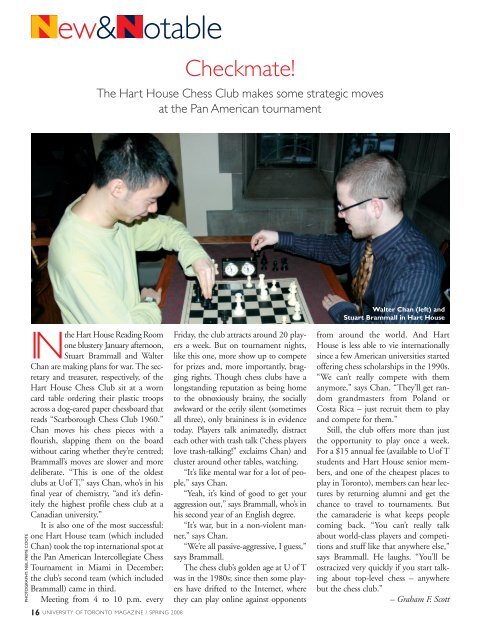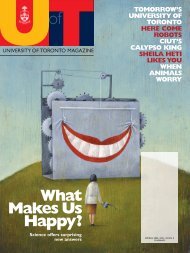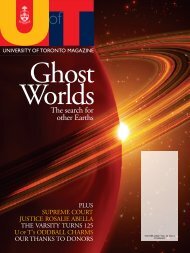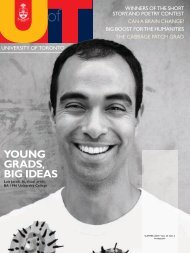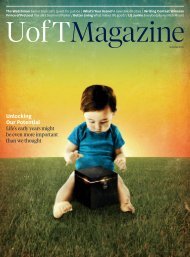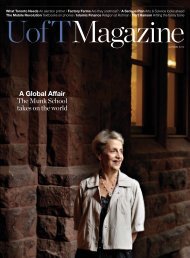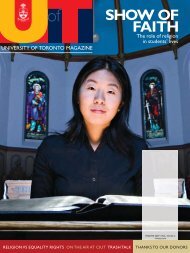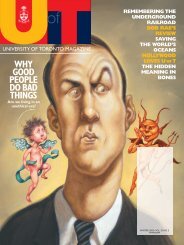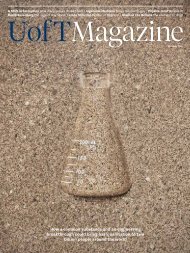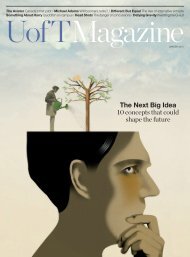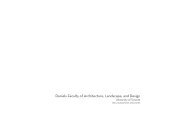20 MB - University of Toronto Magazine
20 MB - University of Toronto Magazine
20 MB - University of Toronto Magazine
- No tags were found...
You also want an ePaper? Increase the reach of your titles
YUMPU automatically turns print PDFs into web optimized ePapers that Google loves.
New&NotableCheckmate!The Hart House Chess Club makes some strategic movesat the Pan American tournamentWalter Chan (left) andStuart Brammall in Hart HousePHOTOGRAPHY: NEIL PRIME COOTEHart House Reading Roomone blustery January afternoon,INtheStuart Brammall and WalterChan are making plans for war. The secretaryand treasurer, respectively, <strong>of</strong> theHart House Chess Club sit at a worncard table ordering their plastic troopsacross a dog-eared paper chessboard thatreads “Scarborough Chess Club 1960.”Chan moves his chess pieces with aflourish, slapping them on the boardwithout caring whether they’re centred;Brammall’s moves are slower and moredeliberate. “This is one <strong>of</strong> the oldestclubs at U<strong>of</strong> T,” says Chan, who’s in hisfinal year <strong>of</strong> chemistry, “and it’s definitelythe highest pr<strong>of</strong>ile chess club at aCanadian university.”It is also one <strong>of</strong> the most successful:one Hart House team (which includedChan) took the top international spot atthe Pan American Intercollegiate ChessTournament in Miami in December;the club’s second team (which includedBrammall) came in third.Meeting from 4 to 10 p.m. every16 UNIVERSITY OF TORONTO MAGAZINE / SPRING <strong>20</strong>08Friday, the club attracts around <strong>20</strong> playersa week. But on tournament nights,like this one, more show up to competefor prizes and, more importantly, braggingrights. Though chess clubs have alongstanding reputation as being hometo the obnoxiously brainy, the sociallyawkward or the eerily silent (sometimesall three), only braininess is in evidencetoday. Players talk animatedly, distracteach other with trash talk (“chess playerslove trash-talking!” exclaims Chan) andcluster around other tables, watching.“It’s like mental war for a lot <strong>of</strong> people,”says Chan.“Yeah, it’s kind <strong>of</strong> good to get youraggression out,” says Brammall, who’s inhis second year <strong>of</strong> an English degree.“It’s war, but in a non-violent manner,”says Chan.“We’re all passive-aggressive, I guess,”says Brammall.The chess club’s golden age at U <strong>of</strong> Twas in the 1980s; since then some playershave drifted to the Internet, wherethey can play online against opponentsfrom around the world. And HartHouse is less able to vie internationallysince a few American universities started<strong>of</strong>fering chess scholarships in the 1990s.“We can’t really compete with themanymore,” says Chan. “They’ll get randomgrandmasters from Poland orCosta Rica – just recruit them to playand compete for them.”Still, the club <strong>of</strong>fers more than justthe opportunity to play once a week.For a $15 annual fee (available to U<strong>of</strong> Tstudents and Hart House senior members,and one <strong>of</strong> the cheapest places toplay in <strong>Toronto</strong>), members can hear lecturesby returning alumni and get thechance to travel to tournaments. Butthe camaraderie is what keeps peoplecoming back. “You can’t really talkabout world-class players and competitionsand stuff like that anywhere else,”says Brammall. He laughs. “You’ll beostracized very quickly if you start talkingabout top-level chess – anywherebut the chess club.”– Graham F. Scott


